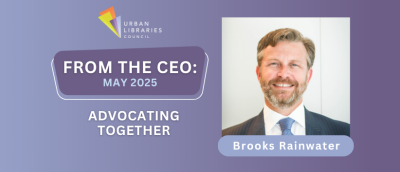Advocating Together

Written by Brooks Rainwater, President and CEO, Urban Libraries Council
As the federal landscape continues to shift, the role of the library field’s collective leadership has never been more important—or more urgent. With most state libraries receiving notice last week that their IMLS funding may be cut in half for FY2025, I want to update you on how ULC is stepping up to meet this moment and how your voices are helping to lead the charge.
Our goal is to speak to as many leaders on the appropriations and committees with oversight of IMLS to advocate for funding in FY 2026. We are also pushing back on the chaotic cancellation of current grants and gutting of IMLS as an agency, as well as lack of any communication from the new agency leadership. Since mid-March, we have been securing both Republican and Democratic meetings and providing timely information to congressional leaders on the ongoing actions to cut IMLS funding (they often are not aware). As we do this work, we are educating offices on the impact of public libraries.
We also recognize that these awful and unprecedented moves against IMLS will have devastating consequences for our colleagues in rural and small libraries. That’s why we’ve partnered closely with the Association for Rural and Small Libraries (ARSL) to invite them to these conversations and bring a united front to Capitol Hill.
We have been doing this work in addition to ULC’s advocacy efforts, which include recognition and funding for libraries as essential public infrastructure, literacy leaders, and workforce centers. ULC was proud to be cited as a supporter of the newly reintroduced Adult Education WORKS Act, a bipartisan bill led by Senators Todd Young (R-IN) and Jack Reed (D-RI) aimed at strengthening and expanding adult education programs nationwide. We also continue to press for fair e-content pricing and access, challenges to intellectual freedom and we continue our partnership with Microsoft Tech for Social Impact to find solutions for the ongoing licensing issues.
We’re grateful to the many ULC members who have already joined these meetings—often on short notice—to share compelling stories and local data that truly break through to legislative aides.
We also have compiled further stories of the impact of IMLS in communities. We encourage you to keep inviting members of Congress into your libraries. Keep telling your stories. Keep showing them that libraries are essential infrastructure for education, workforce development, civic life, and so much more.
Together, through ULC, we are stronger. Let’s continue to lean into each other and speak with a shared voice for the future of libraries.
